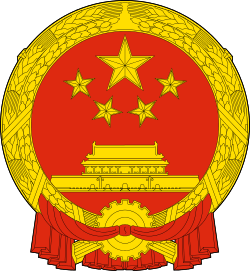Extradition law in China
Extradition law in China is the formal process by which a fugitive found outside China's jurisdiction is surrendered to the jurisdiction where an alleged offence has taken place for trial or punishment, under Chinese law.
Extradition from China
China currently grants extradition to both states which maintains extradition treaties with and states which assure reciprocity.[1] Extradition from China can be sought if: (1) the conduct indicated in the request for extradition constitutes an offence according to the laws of both China and the Requesting State and (2)the request for extradition is made for the purpose of instituting criminal proceedings, the offence indicated in the request for extradition is, under the laws of both China and the Requesting State, punishable by a fixed term of imprisonment for one year or more or by any other heavier criminal penalty.[1] Additionally, provision (2) grants states the ability to request extradition when persons already been convicted, but have a remaining sentence of at least six months at the time of the request.
All requests for extradition are required to be made via diplomatic channels using a handwritten application.[2] Along with the application, foreign states must also include a warrant of arrest, the necessary evidence to convict said person, and photographs, fingerprints, or other material that might be used to verify the identity of said persons. In cases of extradition to execute a sentence such as granted in provision (2),foreign states must also provide a copy of the written verdict that convicted said person.[1] Additionally, all copies of the aforementioned materials must be accompanied by transliterations in Chinese.
Foreign states must also make assurances that they will not investigate extradited persons for any other criminal offenses other than the one those they have been extradited for. Additionally, foreign states must assure they will not extradite extradited persons to a third state unless by the extradited persons' own will.[1]
Following receipt of the request, the request is examined by the Ministry of Foreign Affairs where if it is found to be accordance with Chinese extradition law, it passed on to the Higher People's Court where it is ruled whether the People's Republic of China will honour the extradition request.[1] The decision by the High People's Court is subject to that of the Supreme People's Court where it may be struck down.[1]
Countries with which China maintains extradition treaties
China maintains extradition treaties with 39 nations.[3] Among them are:
- Belarus[2][4]
- Bulgaria[2][4]
- Cambodia[2][4]
- Kazakhstan[2][5][4]
- Kyrgyzstan[2][4]
- Laos[2]
- Mongolia[2][5][4]
- Lithuania[2][6]
- Peru[2][6]
- Russia[2][5][4]
- The Philippines[2][6]
- Portugal[5]
- South Africa[2][6]
- South Korea[2]
- Romania[2][6]
- Spain[5][7]
- Thailand[2][5][4]
- Tunisia[2][6]
- The United Arab Emirates[2]
- Ukraine[2][4]
- Uzbekistan[5][4]
References
- 1 2 3 4 5 6 "Extradition Law of the People's Republic of China (Order of the President No.42)" (PDF). December 28, 2000.
- 1 2 3 4 5 6 7 8 9 10 11 12 13 14 15 16 17 18 19 "Judicial Assistance: Extradition". Ministry of Justice of the People's Republic of China. 2009.
- ↑ "China signs extradition treaties with 39 nations". China Daily. Retrieved 2015-07-04.
- 1 2 3 4 5 6 7 8 9 10 "China's Extradition Law of 2000" (PDF). chinesejil.oxfordjournals.org. Peking University School of Law. Retrieved 2015-07-04.
- 1 2 3 4 5 6 7 "China plans to sign extradition treaties with countries". Retrieved 2015-07-04.
- 1 2 3 4 5 6 China Foreign Policy and Government Guide. International Business Publications USA. 2007-02-07. ISBN 9781433006869.
- ↑ "Treaty number 127570". World Treaty Index. Retrieved 2015-07-04.
